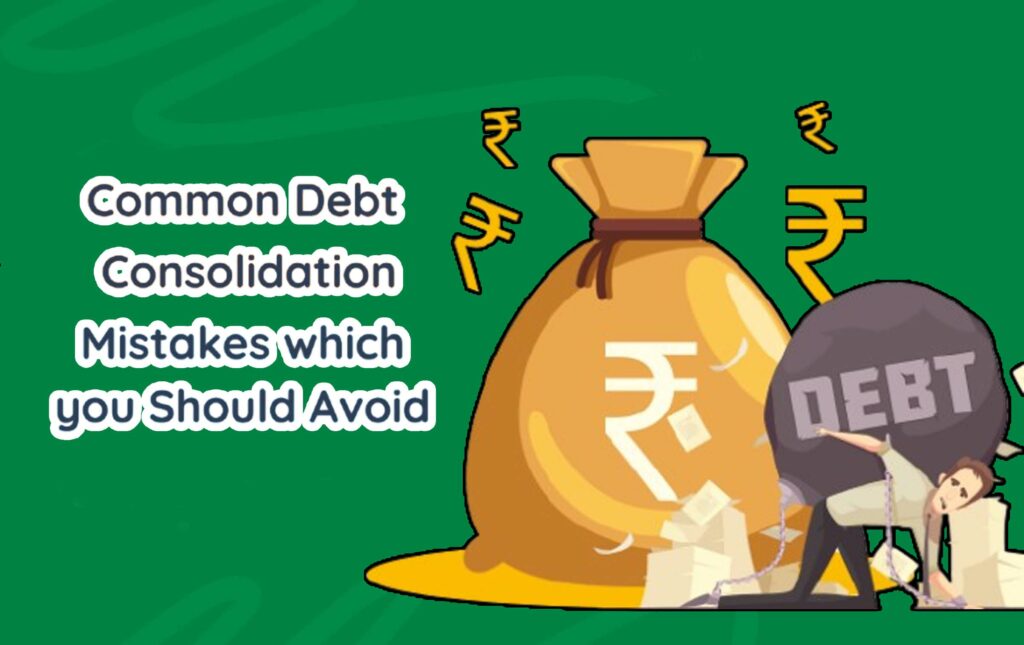Common Debt Consolidation Mistakes to Avoid – Consolidating debts is one of the many ways to improve your financial situation. It makes paying off loans much faster and easier. Although it offers several advantages, it can hurt you in several ways if the wrong process is followed. While consolidating debts, there are several common debt consolidation mistakes to avoid. Borrowers often make these mistakes, making consolidating their debts quite difficult to achieve.

Debt consolidation can be a helpful tool for getting out of debt more effectively at lower interest rates. Just like every other type of debt, improper management of loan consolidations can affect your credit and finances negatively. Before consolidating your loans, this write-up contains some of the common mistakes you should avoid during the process.
8 Common Debt Consolidation Mistakes to Avoid
As previously stated, debt consolidation can help borrowers save on interest and get off debt much faster. While consolidating your debts, it is important to not only be aware of these mistakes but also how to avoid them. However, here are some common mistakes you should avoid:
Not Working on Your Credit Before Application
Your credit is a key factor considered by most lenders when taking a loan, irrespective of type. It determines your interest rates as well as whether or not you will be approved for a loan. Before applying for debt consolidation, it is important to take steps to improve your credit. Doing this can help you save throughout your loan lifetime. However, the following is some information you should check out before applying for the loan:
- Review your credit history.
- Check for mistakes.
- Review your credit utilization rate.
- Work on your credit.
- Wait a few months before applying.
Failure to Review Your Options
Debt consolidation is not the only option to pay off debts. It is important to evaluate which of these steps is best for you. There are several methods to pay off your debts. These methods include:
- Visiting a credit counselor.
- Creating a payoff plan.
- A balance transfer card.
Sinking Deeper Into Debts
While all your loans are paid off, debt consolidation compresses all your loans into a single loan, giving relief from the burden of other debts. This seems right, but it can also put you in a tougher situation if your credit card balances are reduced to zero, meaning you will be spending more. In cases like this, avoid agonizing over any credit card balance after consolidation.
Missing a Payment
Similar to any kind of debt, there are severe consequences if a payment is missed for thirty days or longer. Not only can it have a potential negative effect on your credit score, but missing a payment could lead to fees from lenders. To prevent this mistake, set up auto-pay for at least the minimum amount. Moreover, setting up automatic payments can potentially lead to a lender discount and ensure timely payment.
Getting High Interest Rates
Consolidating your debts into a single loan won’t lead to financial savings if the new loan has higher interest rates than the initial one. A consolidation loan’s rate should be lower than the average interest rate on the credit card balance you intend to merge. Furthermore, this determines the overall cost of your debts to you and calculates the weighted average of your debts to understand what you’re paying.
No checking for fees
If you apply for a debt consolidation loan, it’s crucial to be aware of two fees, such as prepayment penalties and origination fees. An origination fee is an upfront fee most lenders charge for processing your loan. Additionally, you can prevent such charges by shopping around for a lender that does not impose an origination fee.
However, you should also avoid loans with no prepayment penalties. It’s advisable to pay off an interest-bearing debt immediately, so you don’t want to pay penalties for taking out a loan early and making unnecessary payments.
Mistaking settlement for consolidation
Debt settlement companies may offer a solution to consolidate high payments into one, reducing owed lenders. However, this often leads to missed payments and delinquencies on credit reports. Settlements for less than the total amount can also be a red flag to future lenders. Furthermore, debt settlements are not guaranteed for successful negotiation.
Failing to get the source of your debt
A debt consolidation loan is a means of reducing interest rates and monthly payments, but it doesn’t make your debt disappear. However, you should make sure you’re addressing the underlying causes of your debt. Furthermore, if overspending has put you in a debt spiral, create a new plan for living within your means, adhering to a budget, and establishing financial stability.



